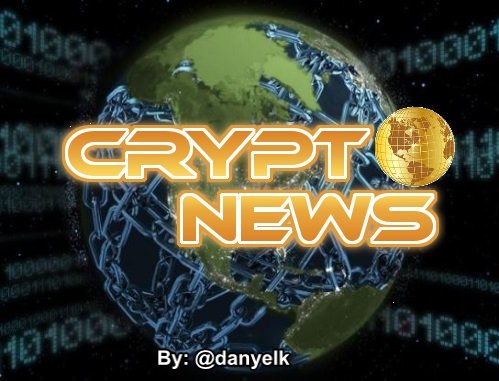
- The 10 Biggest Myths about Cryptocurrencies - Part 1!
- Dubai Blockchain Strategy wins Award in Barcelona!
- Lightning Network handles Transactions between Bitcoin and Litecoin Blockchains!
- Australia: Government funds Blockchain Energy Project!
- UBS: We don't want to have anything to do with Bitcoin!
- ETHLend launches Token Sale on November 25th and opens Whitelist!
- Bitcoin Course Challenge Week 7



In the series "The 10 Biggest Myths About Cryptocurrencies", I'd like to take a closer look at the top 10 claims about cryptocurrencies and their opportunities and risks. In doing so, I will daily explore a new myth and check it for accuracy.
Myth 1: Cryptocurrencies are mainly used for criminal business such as money laundering
The first myth is the widespread belief that Bitcoin and other cryptocurrencies are used primarily to perform and conceal crooked deals. There are two types of criminal activity when using Bitcoin:
On the one hand, it is said that the Bitcoin is used to operate shady deals. Pornography, terrorism or international drug trafficking, the list of illegal activities is long. In this context, cryptocurrencies should be a popular means of payment for buying and selling prohibited goods, above all because of their anonymity.
On the other hand, cryptocurrencies are to be abused as a means of illegal financial transactions. Especially for money laundering activities, tax fraud and the blurring of financial market profits should serve the storage of cash in cryptos.
But how bad is it really about the crypto-abuse? It can not be denied that in the past Bitcoin and other cryptocurrencies were used to trade illegal goods. Likewise, cryptocurrencies have been used for money laundering activities or the like. However, the mere fact that these cases were known and clarified reveals that it can not be so easy to use digital currencies for criminal purposes.
For example, a Bitcoin transaction may appear protected and anonymous at first glance, but a transaction stored in the blockchain is forever traceable. Accordingly, it is therefore wrong to talk about anonymity in Bitcoin. Bitcoin is a pseudonym and authorities and other actors have proven many times that they are able to track down the person behind the Bitcoin transaction. Transaction patterns, interfaces to exchanges and left-over tracks on other platforms make Bitcoin seem only anonymously. The situation is different with the "largely" anonymous crypto currencies such as Monero or ZCash, which makes identification much more difficult, but not impossible.
As a result, cryptocurrencies are only marginally better suited to criminal business than fiat currencies.
Moreover, there are no reliable statistics that cryptocurrencies indeed have a higher frequency of illegal transactions than, say, the euro or the US dollar. Accordingly, this myth tends to be relativized: there are cases of abuse for criminal business, but these are neither an exclusive cryptocurrency phenomenon nor are they the dominant use of digital currencies.
Bitcoin is no longer just the currency of the darknets. Due to the increasing mainstream adaptation, the connotation with illegal business is being further reduced. The best examples of change of mind are the big newspapers. While almost all Bitcoin articles about bitcoin usage in the darknet one year ago, there are fewer and fewer articles of this design currently available. Rather, the price potential is now "at once" in the center.


The Smart Dubai Office won the coveted City Award for the Dubai Blockchain Strategy at the Smart Cities Expo and World Congress in Barcelona. Over the weekend, they have won against 308 projects from 58 countries.
The World Smart City Award was designed to reward pioneer projects, ideas and strategies that drive sustainable urban development around the globe. Sustainability was already set in the implementation of the event. According to officials, the event ran without CO2 emissions. In addition, leftovers were donated and an attempt was made to completely dispense with paper. On more than 30,000 m², a total of 675 exhibitors were present to present their current solutions. Dubai was the most sustainable.
The smartest city in the world
At the seventh Smart Cities Expo and World Congress, the project has achieved its ambitious goal of becoming the smartest city in the world by 2020. With the Dubai Blockchain Strategy, the largest city in the United Arab Emirates wants to carry out all its transactions paperless by 2020. What is also high on the list of innovations is the satisfaction of the citizens:
Dr. Aisha Bint Butti Bin Bishr, General Manager of SDO says:
The three cornerstones of the Dubai Blockchain Strategy
The Dubai Blockchain Strategy has set a total of three goals.
The first is improving the efficiency of the government. To this end, the initiators want to promote the paperless handling of private and public transactions. For example, they want to digitally process visas, invoices and driving license matters. According to the official announcement, this will save 114 million tons of CO2 emissions and up to 25.1 million hours of work.
The second pillar is the promotion of industry. With the Dubai Blockchain Strategy, the founders want to create a system that allows citizens to start new blockchain businesses. Above all, they want to focus on the real estate, fintech and banking industries. It also focuses on areas such as health care, urban planning, smart energy, digital commerce, tourism and transport.
In the latter area, the German company will also be involved in the big project. Together with Volocopter, Dubai's "Roads and Transport Authority" announced in September the successful test of an autonomous air taxi. The Volocopter steered the Sheikh Mohammed bin Rashid Al Maktoum through the skyscrapers for 8 minutes. By 2030, all public transport in the city on the Persian Gulf is to run without human intervention.
image source
The third pillar of the Dubai Blockchain Strategy is global cooperation. So the city of millions wants to open its platform for international partners to guarantee safety and comfort for travelers. Therefore one wants to facilitate for example the entry through faster settlement at the customs. The use of blockchain technology also facilitates the mobility of the guests.
For bureaucratic hurdles such as the control of the driver's license, the car rental or the connection to the Internet and of course payment transactions with Bitcoin & Co. are automated with the project. To develop and develop the necessary technologies, they want to merge with partners from Europe, North America and Asia.
Occupation with Blockchain pays off
There were six other awards at the event. The categories were: Innovative Idea, Project, Circular Economy Project, Safe Cities Project, Mobility Project and Data & Tech Project. The awards went to Marketplace.city, a food supply initiative from Buenos Aires, the Circular Innovation Program from Amsterdam, Traffic Brain from Shenzen, Easy Urban Mobility from SEAT and the Smart City Project from Yanbu. The awards promise a promotion of the projects and a high public attention, which feeds not least from the 18,000 visitors. The award particularly attracts investors and entrepreneurs who want to invest in the future of the winners.
Dubai's preoccupation with blockchain technology is therefore clearly bearing fruit. The land registry office had already announced that it would change its administration to Blockchain. In addition, the government has been thinking about its own cryptocurrency and, last year, considered using blockchain technology against illegal immigration.


The Lightning Network, one of the technological milestones in the development of blockchains such as Bitcoin or Litecoin, came into play last week. As part of a trial, the Lightning Network conducted a transaction between the two test nets of the Bitcoin and Litecoin blockchains.
One of the main promises of Segway Bitcoin blockchain activation in August was the possibility of implementing the Lightning Network, which was hoping to be part of the solution to the ever-increasing scaling problem of the Bitcoin network. The big technological advancement that the Lightning Network should bring is that payments are made through many separate micro payment channels that make it possible to make bookings virtually past the blockchain. Instead, two users can make as many transactions as they like without informing all the participants in the block chain about the cash flow. Only the final amount of their transaction will be noted afterwards in the blockchain transparent for all.
For months, however, the Bitcoin community had waited in vain for a final use of the Lightning Network and thus to complete the SegWit update. The extent to which the upcoming, now completely canceled SegWit2x activation played a role in the delay can not be established beyond doubt. However, just a week after rejecting SegWit2x, the Lightning Network has now found use in a cross-block transaction for the first time.
A so-called atomic swap was carried out, ie a direct exchange of one cryptocurrency into another. This took place off-chain, so that the transaction is not recorded on any of the two blockchains. Compared to on-chain solutions, this significantly reduces transaction costs and time.
The scene of this experiment were the two test nets of the blockchains of the cryptocurrencies Bitcoin and Litecoin. This process is noteworthy in that it was not Bitcoin, but its little sister Litecoin (often titled before Bitcoin-Bitcoin-Cash-Hard-Fork), who was the first to activate SegWit and thus implement the Lightning Network far ahead of the Bitcoin network. Thus, the update for Litecoin acted as an unofficial test run for the Bitcoin community.
Meanwhile, Bitcoin has also gone that step, making the transaction now possible. Thus, in the future probably a greater interoperability between Bitcoin and altcoins be created in the cryptocurrencies without major circumstances and especially without intermediaries such as crypto exchanges, exchanged and exchanged again. How revolutionary and above all mass-suitable this technological development really is will have to be seen in a long-term observation of the Lightning Network adaptation.


The Government of Australia is teaming with private investors to fund a blockchain project in southern Australia. The project aims to develop a system for supplying the region with energy and water using blockchain technology.
A total of about 8 million Australian dollars should therefore be provided for the project of the Australian city of Fremantle. The money will be invested primarily for research purposes on the use of blockchain in the decentralized energy and water supply of the South Australian city. Above all, questions for the planned project as a test attempt play a role.
In realizing the project, the Australian government is working with partners in a variety of fields, including research, infrastructure and technology. On board are, for example, the blockchain start-up Power Ledger, which comes from the South Australian city of Perth, the Australian Energy Market Operator (AEMO) and the government-related research center for decarbonization, ie for a conversion of the energy industry to a less carbon-intensive production.
Accordingly, the project's objective is to optimize low-carbon and low-cost power generation with the help of blockchain. To this end, essential technologies for the generation and use of green energy and ecological water production, such as solar panels or charging stations for electromobility, are to be integrated into the blockchain ecosystem of energy production. Their technology and data analysis should help to make the entire system more efficient.
Out of the 8 million Australian dollars made available, around 2.5 million come directly from the Australian state, with the remainder being made up of funds from the co-operating partners who provided the sums. The funding initiative is part of the government's Smart City and Suburbs Program, which aims to test the distributed and connected infrastructure of future smart cities. The project is initially designed for 2 years.
Australia has been open to blockchain implementations in the past, for example, organizing the certification of benefits and degrees at Melbourne University through Distributor Ledger Technology.


Financial Services UBS does not want to work with Bitcoin or other cryptocurrencies, a bank executive now said.
Mark Haefele, Chief Investment Officer (CIO), said in an interview with Bloomberg that the lack of legal regulation and the "critical mass" keep the company, which is the largest bank in Switzerland, away from the cryptocurrency market.
Haefele also considers it possible that the government could ban Bitcoin in the future. He cited the financing of terrorism as a reason, which also rates UBS as a disadvantage of the cryptocurrency.
Mark Haefele said:
Since Bitcoin is not distributed by any government, it could be used to avoid being controlled. Haefele, however, assumes that this situation will soon change.
An urgent question therefore is when to stop investing in Bitcoin.
Haefele is not UBS's first public concern over Bitcoin. Even the head of the Department of Economic Affairs, Paul Donovan, criticized. In tweets he compared the cryptocurrency with the tulip mania in the Netherlands.
CEO Sergio Ermotti also told CNBC in an interview last month that he is more interested in blockchain than cryptocurrency.


ETHLend is an Ethereum-based, decentralized P2P lending application. The project already has a working product and an international team committed to making finance fairer and more accessible to everyone around the world.
The aim of ETHLend is to make lending more democratic by eliminating interest rate differentials between countries and creating a trusted credit network without the need for banks and governments. As a result, someone from Tokyo can spontaneously lend money to someone from Delhi, so lending becomes "limitless".
The ETHLend DAPP offers a fully decentralized P2P lending smart contract on the Ethereum blockchain for granting digital token (ERC-20) or Ethereum Name Service Domain (ENS) ethers as security. Reputation-based lending allows unsecured loans and thus a financial benefit. The technical road map envisages an interesting integration for the coming year and includes fiat lending, crowd lending, token borrowing for short selling and many other improvements.
As ETHLend evolved the decentralized application, the team also announced details of the upcoming token sale. ETHLend introduced LEND tokens for participants participating in the token sale. The main feature of LEND is the ability to use the token to pay for deployment fees at ETHLend at a 25% discount compared to using ETH. Additionally, based on the community proposals, ETHL will provide additional privileges for LEND token holders once the DAPP has evolved into a larger and more comprehensive credit market.
ETHLend also introduces the ongoing AirDrops for loyal LEND holders. They receive LEND tokens based on their frequency of use, which can only be used as collateral, if they regularly use the DAPP. On the one hand, they strengthen the platform while, on the other, motivating users to use decentralized lending. LEND is designed to increase user adoption and add value to the product. As more users use the application, there are more lenders and borrowers who are buying the LEND token from the token market and thus increasing the value.
ETHLend opens the limited whitelist for 5,000 token sellers on November 15, 2017 at 12:00 GMT. The whitelist link will be available immediately at https://ethlend.io. For the whitelist, participants must enter their details and the amount, confirm their identity and email address. Within 48 hours, the applicant will receive an e-mail informing him of his acceptance or rejection. The participation of US citizens is not allowed.
Participants receive a 10% bonus on token sales for the first batch sold and 5% for the second batch. The goal of the token sale is 37,600 ETH, which is needed to finance the further research and development of decentralized lending as well as marketing and operating costs in order to be able to work long-term and sustainably.
Disclaimer:
The information presented in this post is not a recommendation for purchase or sale. It is only an opinion of me the author. They serve merely to describe the project and are not to be understood as an investment analysis.


Don't miss your CHANCE to Win 💰 20 Whaleshares + 40 Hairshares💰 in the 🏆BITCOIN COURSE CHALLENGE Week 7🏆
How and where to participate? Just click HERE!


I wish you all a lovely Tuesday!!!
ⓁⓄⓥⒺ & ⓁⒾⒼⒽⓉ
Best regards
@danyelk
.gif)


